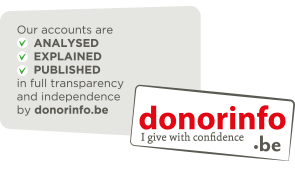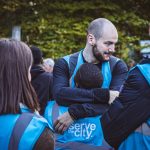No bed, no bath, no bread for asylum seekers this summer. Over the last few months, the situation for people seeking asylum in Belgium has become more and more precarious. You have likely heard news readers talking about Petit Château or Klein Kasteeltje, which is the place where asylum seekers start the registration process and apply for housing. You may also have read one of the many articles that have been written about the ongoing chaos. Often, though these reports don’t really touch upon the effects that the chaos is having on the asylum seekers themselves.
The Belgian authorities are required by law to provide shelter for those who are asking for international protection. With shelters full and office staff of Fedasil, the Belgian institution responsible for reception of asylum seekers, overstretched, hundreds of people are forced to sleep on the streets without any access to food and water. They have no toilets, showers or anywhere to wash their clothes. People are suffering from dehydration and malnutrition and disease like scabies have started to spread. The general health of the people is declining very quickly, with many of them needing medical attention they don’t get. It is not an exaggeration to call this a humanitarian crisis.
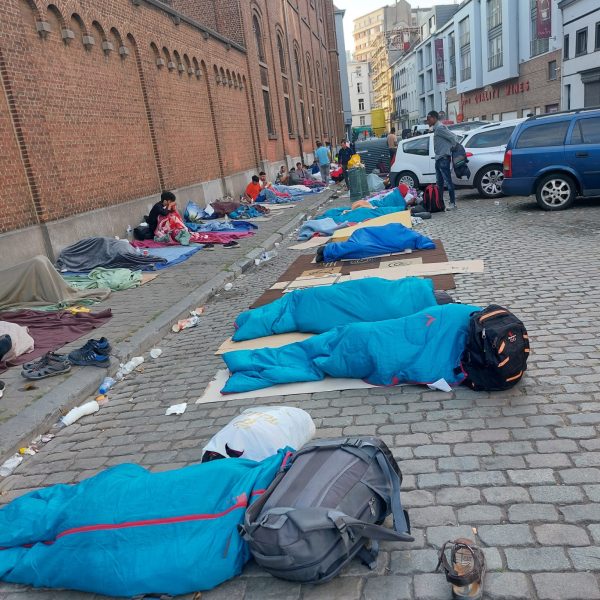
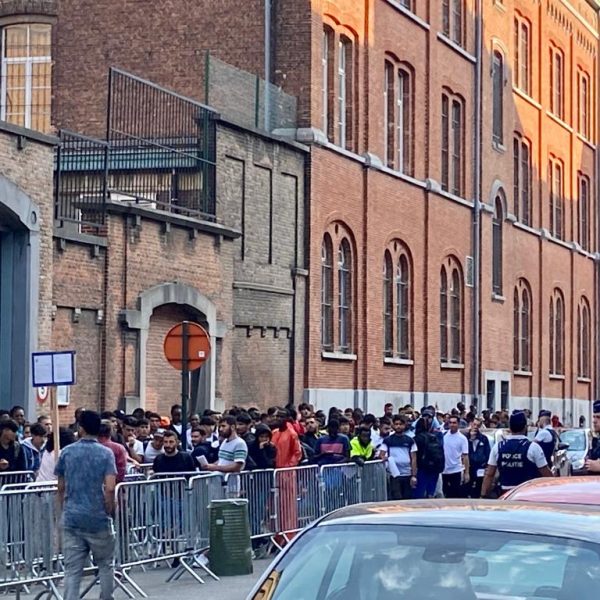
This situation is getting worse by the day and there is still no real solution. At the very end of August, the place of registration was moved from Petit Château to offices of the Immigration Department near Pacheco. To request housing however, they still need to go to Petit Château, where the majority of people are refused. For the people living near Petit Château some of the chaos has been moved out of their neighbourhood, providing some relief. The same cannot be said for the asylum seekers. They still have no bed, no bath, no bread.
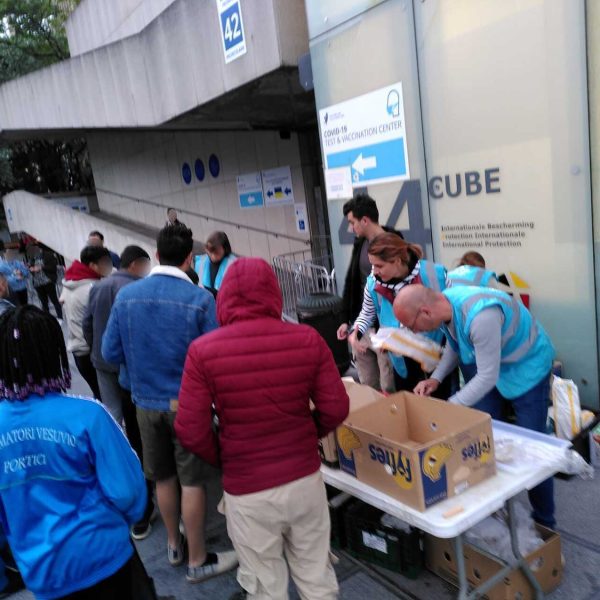
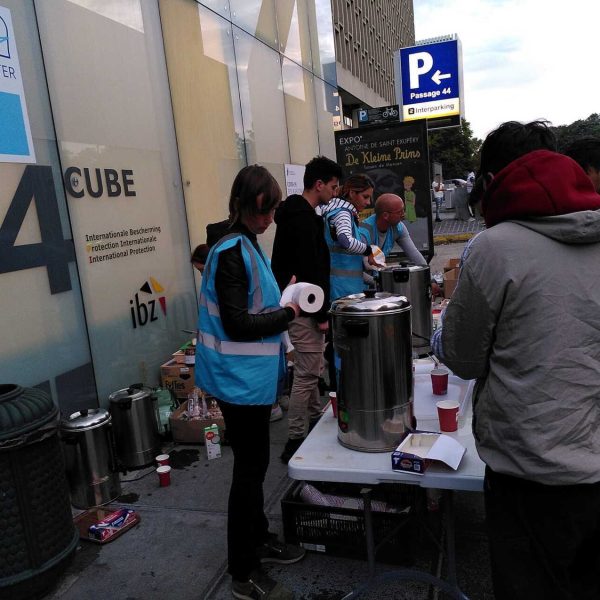
Every Monday and Tuesday morning, Solidarity Breakfast volunteers try to provide some moments of relief. The team might not be able to bring a bed or a bath, but they can bring bread. Hot drinks are distributed, sandwiches and snacks are handed out, with the hope that this will bring some small comfort to those forced to spend their nights on the street.
“It is challenging to see so many people lacking even the basic provisions of safety and shelter week after week – we often meet the same people at each breakfast service. Although as volunteers we can’t fix the problems in the current reception system, we can make someone’s day a little bit more manageable and also raise awareness in the community to bring about the needed changes – that is what motivates me to keep doing the project.” Lucinda, one of the project leaders of Solidarity Breakfast shares.
To help Lucinda and Serve the City continue supporting people in desperate need, please give what you can.
Continue reading for a testimony of one of our volunteers, Jennifer, written in June, prior to the current crisis.
“Amid the migrant crisis in Brussels, and more broadly in Europe, le Petit-Château was temporarily designated as an arrival centre for foreigners seeking protection. Fedasil, the organisation in charge of managing the arrival centre, states that foreigners applying for international protection are entitled to reception during their application processes. Since December of 2018, the “Little Castle” has been one place for people to stay.
I arrived at le Petit-Château at 7:00 a.m. to help serve a solidarity breakfast. Volunteers gathered there four mornings a week to serve waffles and cakes, bananas, and hot drinks such as tea and coffee. On this Tuesday morning, I could see families of women and children lined up against one side of the castle, where sunlight was just starting to make its way down the brick wall. These asylum seekers were given an appointment ahead of time since women and children are considered especially vulnerable to the consequences of forced displacement. They waited together, sharing blankets, jackets, and a few words of encouragement.
Along another side of the castle was another queue, mostly of young men. Some were sitting, some standing, and most laying down. It was still chilly early in the day, even in June. The nights must have dragged on. The line snaked around the castle, back to the other side that faced the canal, the “tourist” side. As it often is, homelessness is largely invisible or at least obscured. It is often hidden away, swept into corners, and displaced rather than eradicated. Homeless centres are temporary. Many are out of sight, between remote storage buildings.
Some volunteers and I began unloading crates of bread and chocolate spread, which would later be used to make simple desserts and sandwiches. A few boxes of waffles sat beneath our foldable table, next to two boxes of bananas. One of us separated the bananas from each other. Another retrieved paper cups and the milk. We set up two large water boilers used to make tea and coffee on the far right of the table. “Coffee? Tea?” and “Qahwa? Shay?” we asked. “Kava? Chay?” and “Avec du lait?” And when shared vocabulary wasn’t quite enough, smiling and pointing became our universal language.
Yet smiling was easier for those behind the food and drinks table. We had kitchens, bathrooms, and living rooms to go back to at the end of the day. The people who we greeted were running out of room to live. One man came back to the table several times to tell us his life story—how his family was scattered all over Europe and what it was like to come to the castle’s front gates every morning. Sure, it was early; we arrived at 7. But they had been sleeping on the ground for at least 7 hours before we arrived, and many had been doing so at least 7 weeks before I ever stepped foot in Belgium.
There is no roof to protect you from the rain. There is just a plastic bag. There are no nets to catch mosquitos. There is just your skin. There is no shield against the insults and slurs thrown toward you. There is nothing but desensitisation and demoralisation.
Of the over one hundred young men who slept in front of the castle that night, zero were taken in that day.
This is not an uncommon occurrence. From where they stood, they could see the castle, but never made it to the other side. This is their everyday. It is not uncommon to recognise regulars one morning after another at le Petit-Château. It is not uncommon to recognise the homeless on the street night after night. Yet it is even less uncommon that we ignore them. Disengage purposefully for long enough, and they blend together into a single afterthought.
The man who approached the table told us about how he still had hope for opening a restaurant in the future. He was almost cheery, certainly optimistic. He gave large smiles, his head thrown back in laughter on more than one occasion. He had been lining up in front of the centre for months, he said, but believed his turn had to come eventually. I hope we stop turning our heads away sooner than eventually. We can all see the castle as well as the people right next to it.”


